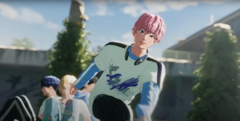Can You Be Sued for Roasting Virtual K-Pop Stars? South Korean Court Says Yes!

Published: 2025-09-19 05:50:17 | Category: technology
A South Korean court has ruled that a social media user must pay 500,000 won (£265) for defaming Plave, a K-pop boyband composed of virtual characters. This case highlights the evolving nature of defamation laws as they pertain to digital personas, particularly in an industry increasingly dominated by virtual idols.
Last updated: 07 October 2023 (BST)
Key Takeaways
- The court ruling marks a significant legal precedent regarding the defamation of virtual idols.
- Plave is one of the first K-pop groups to be entirely composed of virtual characters.
- The group debuted in 2023 and has quickly gained a large following, amassing over one million YouTube subscribers.
- Defamation laws are adapting to accommodate the rise of digital avatars in the entertainment industry.
- The ruling underscores the potential emotional impact on the real individuals behind virtual performances.
The Rise of Virtual K-Pop Idols
In recent years, virtual K-pop idols have surged in popularity across South Korea. Unlike traditional K-pop groups, these avatars are created using advanced technology, including motion capture and animation, allowing them to perform and interact with fans while remaining entirely digital. Plave, which debuted in 2023, stands at the forefront of this trend, demonstrating the industry's willingness to innovate and embrace new forms of entertainment.
With more than one million subscribers on their YouTube channel, Plave has established itself as a major player in the K-pop scene. They regularly release music videos and vlogs, providing fans with a glimpse into the lives of their animated personas. The group's song "Way 4 Luv" was nominated for prestigious awards, including Best Vocal Performance and Song of the Year at the 2024 MAMA Awards, further solidifying their place in the music industry.
The Court Case: Background and Details
The civil suit against the social media user arose from derogatory comments made in July 2024. These comments included offensive language and insinuations about the real-life appearances of the performers behind Plave's avatars. While the defendant contended that the remarks were directed at the fictional characters rather than the real individuals, the court determined that the defamation extended to the performers themselves due to the recognition of the avatars as representations of their real-life counterparts.
The court's ruling, issued in May and publicised in October, ordered the defendant to pay 500,000 won (£265), a decision that sparked discussions about the implications for virtual idols and their creators. Plave's agency, Vlast, initially sought 6.5 million won (£4,500) for each performer, arguing that the comments had caused significant emotional distress. Ultimately, the court awarded 100,000 won (£65) per individual, reflecting its consideration of the severity of the comments and the context of the incident.
Implications of the Ruling
This landmark ruling sets a critical precedent for future cases involving virtual characters in the entertainment industry. As more K-pop groups and personalities take on digital forms, the challenge of protecting the reputations and emotional well-being of the individuals behind these avatars becomes paramount. The case illustrates the complexities of defamation law as it grapples with the implications of digital representation and the potential harm caused by online remarks.
Vlast has since appealed the court's decision regarding the damages, arguing that the case serves as a crucial reference point for the legal treatment of virtual avatars. Advocates for virtual idols argue that this ruling is essential for establishing protections for digital performers, who, like their human counterparts, face public scrutiny and potential harm to their personal lives.
The Benefits of Virtual Idols
Proponents of virtual K-pop idols assert that these digital personas can relieve the pressure often placed on human idols. The entertainment industry is notorious for its intense scrutiny of artists' personal lives, from their appearances to their relationships. Virtual idols can sidestep some of these challenges, allowing for a focus on artistic expression rather than personal attributes.
Furthermore, virtual idols can be designed to embody specific traits or characteristics that appeal to their target audience. This flexibility allows for a diverse range of personalities and styles that can resonate with fans in unique ways, enhancing their connection to the music and its messages.
Challenges and Criticisms
Despite their growing popularity, virtual idols face their own set of challenges. Critics argue that the reliance on digital avatars could diminish the authenticity of the performance experience. Some fans prefer the genuine connection that comes from human idols, who share their vulnerabilities and experiences. This concern raises important questions about the future of virtual entertainment and the balance between technology and human connection.
Moreover, the legal implications surrounding virtual idols remain relatively uncharted territory. As cases like the one involving Plave emerge, it becomes crucial to consider how existing laws can adapt to account for the unique circumstances that arise from the intersection of digital entertainment and personal reputation.
The Future of Virtual K-Pop
As the K-pop industry continues to evolve, the future of virtual idols looks promising. With advancements in technology, these digital performers may become even more sophisticated, offering fans a richer and more immersive experience. However, with this growth comes the necessity for clear legal frameworks that protect both the virtual personas and the real individuals behind them.
As virtual idols gain traction, ongoing discussions about their impact on the entertainment landscape will likely shape the direction of the industry. Legal experts, industry professionals, and fans alike must engage in dialogue about the implications of virtual representations, ensuring that the rights and well-being of all parties involved are safeguarded.
Conclusion
The recent ruling against the social media user in South Korea highlights the evolving dynamics of defamation laws in the context of virtual K-pop idols. As these digital performers continue to gain popularity, it is imperative for the legal system to adapt and provide necessary protections. The case serves as a vital reference point for future instances of defamation involving virtual characters, underscoring the emotional impact such statements can have on the individuals behind the avatars. With the rise of virtual idols, the entertainment industry must navigate the balance between innovation and the protection of personal reputation.
As virtual K-pop continues to thrive, how will legal frameworks evolve to accommodate this new reality? #VirtualIdols #Kpop #DefamationLaw
FAQs
What is Plave?
Plave is a K-pop boyband formed in 2023, consisting entirely of virtual characters that are voiced and animated through motion-capture technology.
Why did the court rule against the social media user?
The court determined that derogatory comments made by the social media user were defamatory, as they targeted the virtual avatars that represent real individuals, causing emotional distress.
What were the comments made about Plave?
The comments included profanity and derogatory remarks about the performers behind the avatars, suggesting they could be unattractive in real life and embodying negative stereotypes.
What is the significance of this ruling?
This ruling is significant as it sets a legal precedent for how defamation laws can apply to virtual idols, addressing the complexities of digital representation in the entertainment industry.
How does this case affect the future of virtual idols?
The case may influence future legal standards and protections for virtual idols, impacting how digital characters are treated under defamation laws and shaping the industry's approach to virtual entertainment.



